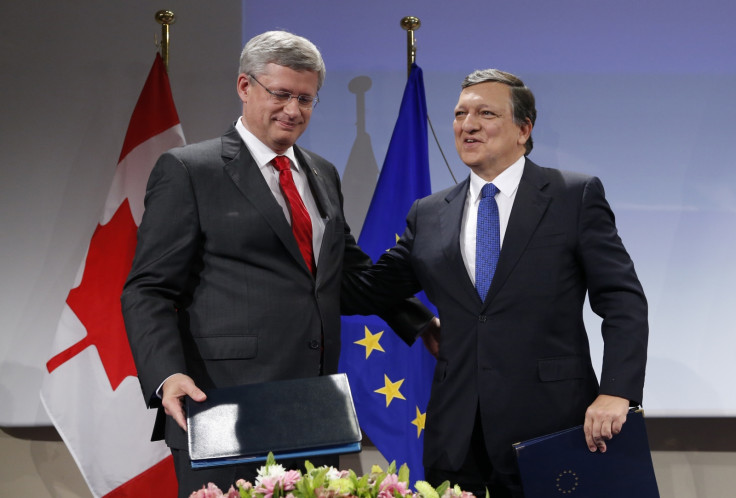Canada and EU Finalise Free Trade Agreement Described as 'Template for TTIP'

Canada and the European Union have finalised a long-mooted free trade agreement, which is viewed in many quarters as a template for the larger EU-US agreement currently under discussion.
The Comprehensive Economic and Trade Agreement (CETA) has been in the works for five years and will remove 98% of tariffs to bilateral trade between Canada and the EU.
The 1,500 page manuscript will now be translated into some 23 languages and reviewed by lawyers, before being released to the public. This process could take some months, with the treaty expected to be ratified within two years.
Some estimate that bilateral trade could be boosted by up to 20% and could be worth a combined $20bn to the respective economies.
However, the deal has faced some difficulty in getting over the line. Ten months ago, Stephen Harper, the Canadian Prime Minister, flew to Brussels to seemingly cross the 't's and dot the 'I's.
CETA was then threatened with being side-lined by rows over financial services and indigenous food groups, with the likes of Greece and Italy fearing that national products such as Feta, Gorgonzola and Parma could lose their 'special' status, which had prevented companies outside these countries manufacturing and marketing identical products.
More recently, the German press reported that Berlin was threatening to derail CETA over the controversial investor-state dispute settlement (ISDS) clause, which Germany forced EU negotiators to remove from the negotiating table in the EU-US discussions over the Transatlantic Trade and Investment Partnership (TTIP).
ISDS is a controversial but commonplace mechanism of free trade agreements, which grants a foreign investor the right to initiate dispute settlement proceedings against a foreign government, pending the results of a public consultation.
A federal spokesperson this week said that the government was "on-side" with the deal and that the ISDS clause did not represent a problem, in its eyes.
Those disputes would appear to have been ironed out, with Canada now becoming the only nation on earth to have almost free access to the world's largest consumer markets, the EU and the US (through NAFTA).
EU analysts estimate it will gain $16.3bn a year from the agreement with Canada, while their counterparts in Ottawa are hoping for a $12bn boost to the economy.
CETA has faced criticism in Canada for its perceived lack of transparency. The opposition New Democrat Party (NDP) welcomed the deal in general terms, but slammed the lack of public consultation.
"The question Canadians are now asking is whether Conservatives negotiated a good deal for Canada. Unfortunately, Conservatives have kept parliament and Canadians in the dark throughout the negotiations with talks conducted in secret and without any transparency," the party said in a statement.
© Copyright IBTimes 2025. All rights reserved.






















